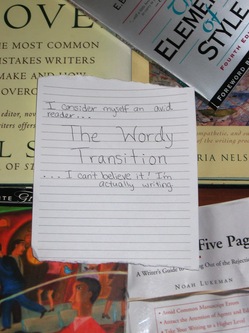The wordy transition: Character development

If the writer can make her characters jump off of the page, her reader will keep turning them.
Think about your favorite books. What really makes them come to life for you? What grabs you by the collar of your shirt and says, “Follow me into this world; I promise we’ll have a good time together?” Is it the exciting, tumultuous, where-will-we-go-next plot? Is it the immaculately described, feels-like-you-are-really-there setting? Or, is it the personable, engaging cast of characters?
While each of these elements must come together to form a well-crafted work of fiction, none is as important as character development. It is the character that takes the reader by the hand and leads her through the places and events that transpire between the book’s front and rear covers. It is the characters who beckon the reader to continue turning pages, even when there is a lag in the action.
Without relatable characters — relatable, not necessarily likeable — do we really care how many crashes, explosions, shocking revelations or unimaginable horrors transpire? The action feels hollow when it is being supported by paper thin characters, characters who fail to come to life beyond the boundaries of the book.
So, as writers, how do we breathe life into our cast?
Well, it takes quite a bit of work. Whereas your ability to describe a setting or craft believable dialogue will become easier with practice, character development always requires diligent, thoughtful work. Each character is different, not only from the others you have created but also from himself. A setting may remain perfectly unchanged throughout a lengthy series, but characters, like people, are constantly changing. They act according to the situations you put them into; they change and grow as the story (and their role in it) progresses.
Many writers like to construct character sketches before officially beginning to write the story. A character sketch might look like an insanely entangled spider diagram or it may be a neat list of questions and answers. It could even be a physical sketch of what that character looks like. But far more important than nailing down a character’s look is capturing his overall essence and the little quirks that bring him to life.
What are the main adjectives you would use to describe him? Is he cynical, happy-go-lucky, cruel, naïve? Does he speak with an accent or always mispronounce a certain word? Does he pull on his ear lobe when he is telling a lie or wring his hands when he feels embarrassed? Is he a consistent character — can you always count on him to do the same thing no matter what the stakes or who is involved? Or, does he act confident and bossy around other boys but completely goofy and shy around girls? You may even want to record such minute details as his favorite food, color or animal. Do whatever you need to do to make him seem real to you. When he is real to you, you have a far better chance of making him real to your readers.
Rather than create pen-and-paper sketches of my characters, I like to spend time mulling them over mentally. I think about them when I am doing something mundane like driving or doing the dishes. I take a few minutes to think about them each day before I begin adding text to my story and again after finishing my writing session. I constantly go back and edit existing scenes as the characters take a more definite shape in my mind, adding in their quirks or even changing how they react to certain events.
For me, two things must happen in order to accept that a character is really real: 1) he must take over a scene, obstinately refusing to say what I want him to say in a given situation, and 2) he must make a cameo in my nighttime dreaming (usually to question me as to why I insist on torturing him, when it is my choice as to whether his life is easy or difficult).
When your characters jump off the page and seem to take an almost physical existence, you know you’re on the right track as a writer. And, yes, it’s kind of like playing God.
Melissa LR Handa is the founder and organizer for the Ann Arbor Classics Book Group and the Lead Books Contributor for AnnArbor.com. Her goal is to make classic literature more accessible to the everyday reader.

